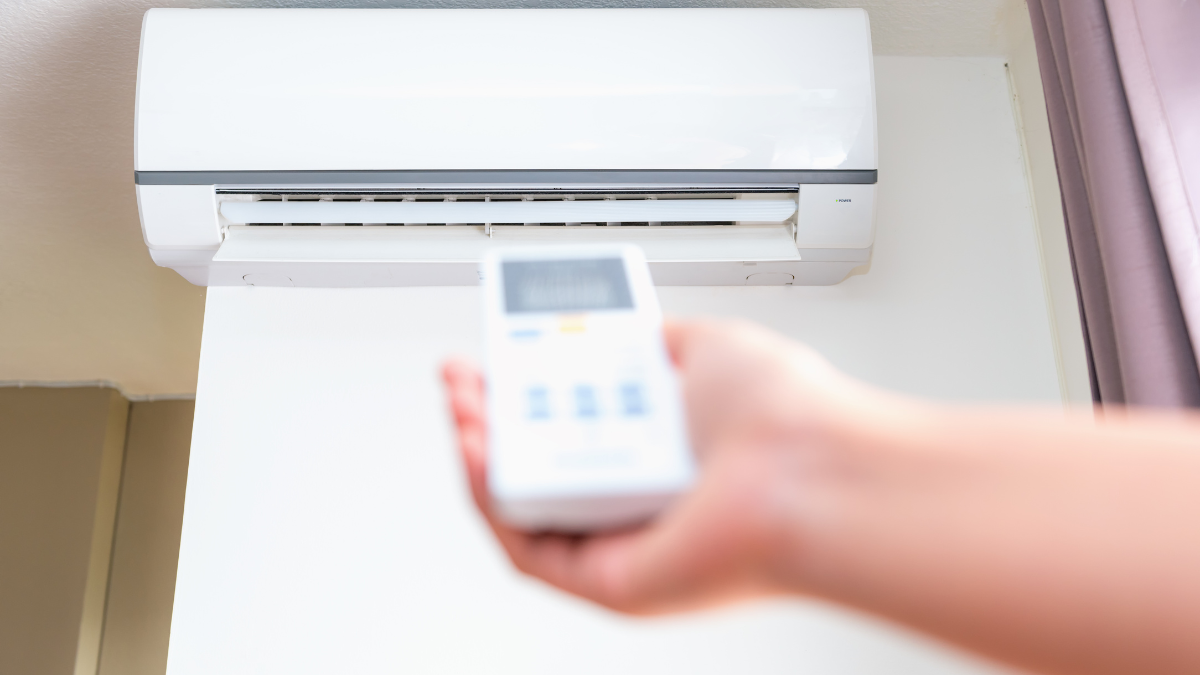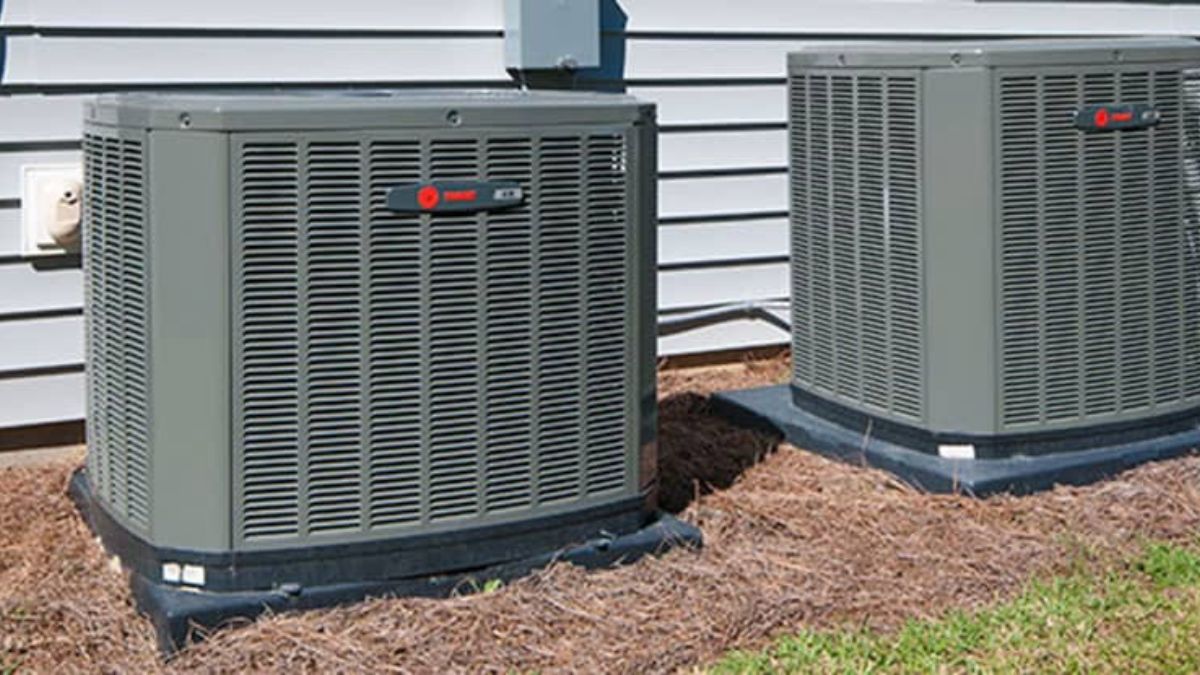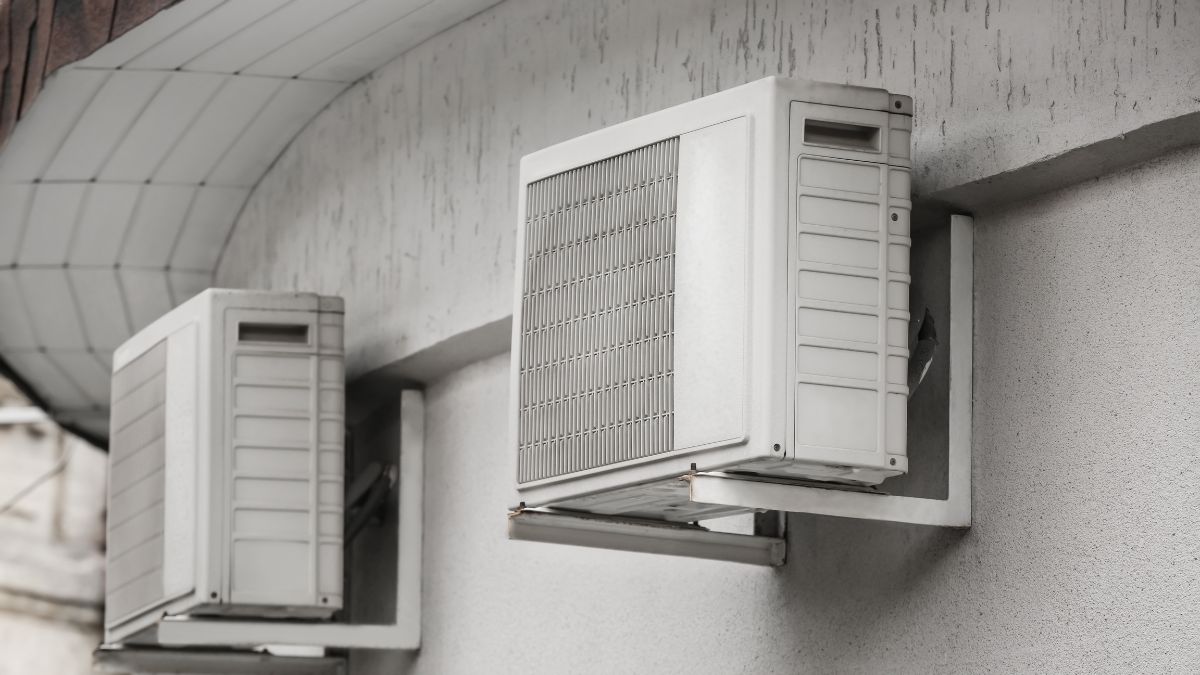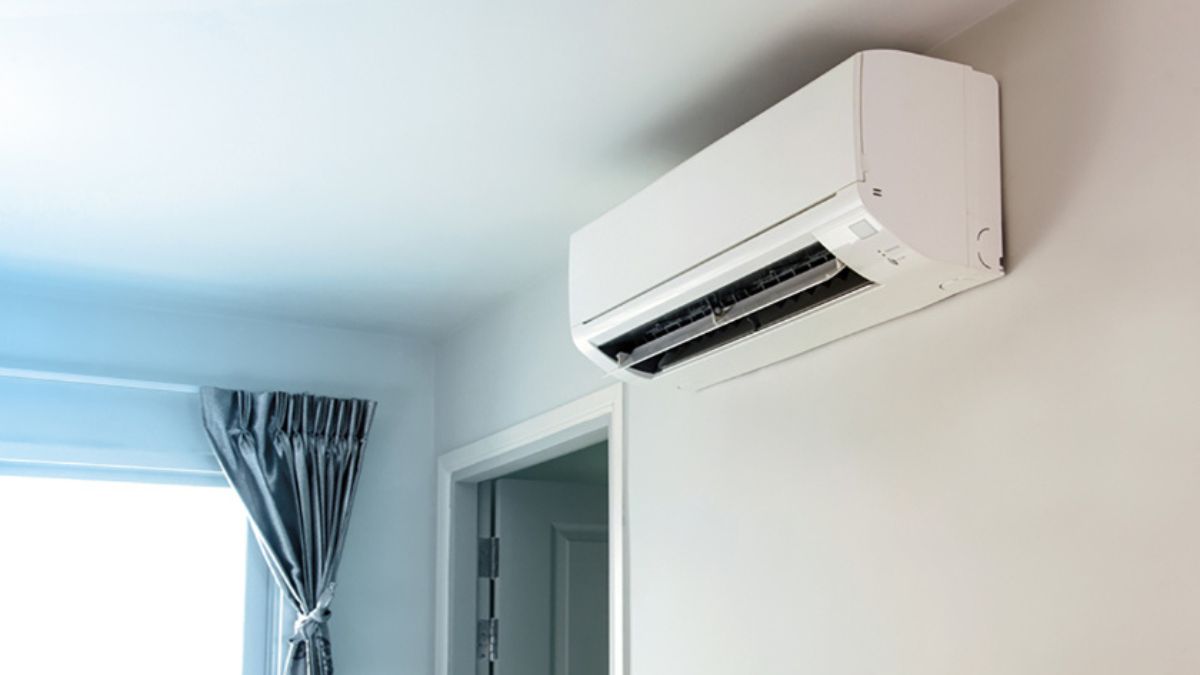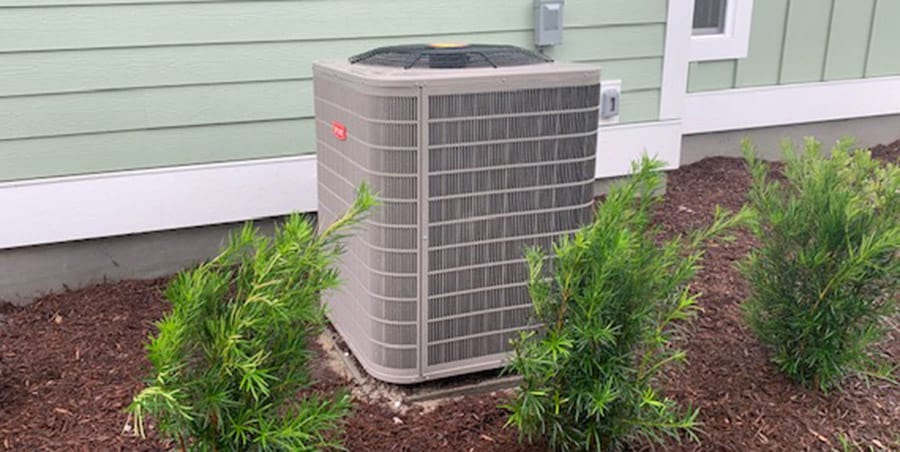
I’ve been aware that air conditioners make a lot of noise, even if it is soothing white noise, and wondered whether heat pumps are the same. I researched the most popular heat pumps to see how noisy they are, and here’s what I found.
So, are all heat pumps noisy? Not all heat pumps are noisy. How loud something is, is measured in decibels (dB). According to experts, 30 dB is considered very quiet. Most heat pumps operate at around 50 dB, roughly the same volume as a refrigerator or a typical car driving past. But, you can find some heat pumps that run as low as 35 dB.
Heat pumps don’t run 24 hours a day, and you don’t normally notice until it shuts off and turns on. So, you’ll want to get the quietest heat pump. Below, I’ll explain the best heat pump brands and which of their models are the quietest.
Is it Normal for a Heat Pump to Make Noise?
It is normal for a heat pump to make some noise. This is because the condenser fan needs to draw outside air across the coils for heat transfer, and the blower fan needs to distribute air throughout your home. Here’s a list of the volume of familiar sounds and where a heat pump fits.
| Sound Source | Volume (dB) | Impact on your hearing while in the same room |
|---|---|---|
| Normal breathing | 10 | Doesn’t cause any discomfort |
| Soft whisper | 30 | Doesn’t cause any discomfort |
| Refrigerator hum | 40 | Doesn’t cause any discomfort |
| Normal conversation | 50 | Doesn’t cause any discomfort |
| Heat pump | 50 | Doesn’t cause any discomfort |
| Washing machine | 70 | Can be annoying |
| Dishwasher | 70 | Can be annoying |
| Lawnmower, leaf blower | 80 | Quite disturbing, hard to concentrate |
The data is provided by the US Center for Disease Control (CDC).
Beyond these levels are sounds like car horns, loud music, sirens, and fireworks, which are very disturbing and can cause hearing loss.
A heat pump doesn’t rattle or tick, and when it does, it’s a sign that it needs to be repaired. With that being said, these are the quietest heat pumps from the most reputable brands.
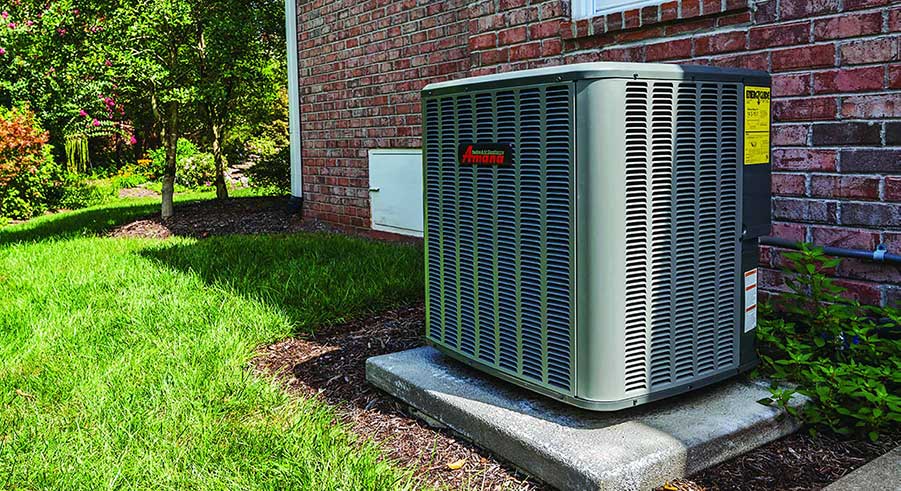
Which Are The Quietest Heat Pumps?
According to HVAC.com, the best heat pump brands are:
- Goodman
- Carrier
- Ruud
- Trane
- Rheem
- Lennox
- Bryant
- American Standard
- Coleman
- York
- Amana
Airplusair.com also says that these are the best brands based on their research. So, I looked at all the models they sell and the operating volume of their quietest model. I displayed them in the table below in ascending order.
Side note on heat pump brands: All things considered, there are few differences in heat pump manufacturers, and many companies manufacture nearly identical equipment under many brand names. See our article Best Heat Pump Systems: A Complete Buyers Guide for 2022.
| Brand | Operating Volume of their quietest model (dB) | Effect of the volume |
|---|---|---|
| American Standard | 43 – 49 | Doesn’t cause any discomfort |
| Trane | 43 – 57 | Doesn’t cause any discomfort |
| Coleman | 47 – 66 | Doesn’t cause any discomfort |
| York | 54 | Doesn’t cause any discomfort |
| Bryant | 55 | Doesn’t cause any discomfort |
| Amana | 55 | Doesn’t cause any discomfort |
| Lennox | 58 | Doesn’t cause any discomfort |
| Carrier | 59 | Doesn’t cause any discomfort |
| Ruud | 67 – 74 | Can be annoying |
| Rheem | 67 – 74 | Can be annoying |
| Goodman | Unknown | n/a |
As you can see, all of the heat pumps that Ruud and Rheem make are a bit loud, according to what the CDC has said. I also reviewed the quietest model from each of the leading brands, using the following criteria.
- SEER rating
- Price
- Size availability
- Customer feedback/reviews
Does The SEER Rating Matter?
The SEER (Seasonal Energy Efficiency Ratio) rating for a heat pump is a number that describes how energy efficient it is.
A higher number means that it’s more energy efficient. There are also various tax credits available at both the federal and state levels for heat pumps above a specific SEER rating.
Currently, the minimum SEER rating for a heat pump sold in the US is 14 in the northern states and 16 in the southern states.
There are also various tax credits you can get by having a heat pump. And I explain what the tax credits are, where to find the ones that can apply to you in How To Determine the SEER Rating of Your Heat Pump – just after halfway through the article.
Also, the US Energy Information Administration sets the requirements for the sale of heat pumps. And they list what states they define as the north and the south.
Because the states that are deemed to be northern and deemed as southern states can be defined differently by different folks because many are near the middle of the country.
As for noise output, SEER rating doesn’t have a great impact on noise. If your existing heat pump is noisy, it’s likely more closely related to age of components rather than the SEER rating.
Compare Noise Output and Price
Pretty self-explanatory. Sometimes it’s the first thing I look at when buying something; then, I balance out the features from there. Nonetheless, a significant number to look at when assessing whether one heat pump is a better choice over another.
It’s unclear if there is an actual correlation between noise output and price. My general indication is there’s no relation between the two. Noise output has more to do with the fan motor sizes, system vibration, and installation rather than the price.
Size Availability
The exact size heat pump you’ll need does differ, so I wanted to check if the specific model comes in various sizes. That way, the chances they have a size model you’re after is higher.
As you may be aware, having a calculation done to see what size heat pump you’ll need to heat and cool your home or office is known as a Manual J. An HVAC consultant typically does it because it’s quite complicated for someone who hasn’t done it before.
See our article Can a Heat Pump Be Too Big for a House? for more information regarding what size heat pump you should purchase.
Customer feedback/reviews
Lastly, I looked at the reviews left by customers and any reviews I could find online to see what people who bought it had to say about it.
Here are the top 3 based on these criteria:
Top 3 Quietest Heat Pumps
| Brand and model | SEER rating | Price (including installation) | Sizes | Average review rating (out of 5 stars) |
|---|---|---|---|---|
| Amana HC AVZC18 | 19 | $4,000 to $7,500 | all sizes | 4.6 stars |
| Lennox XP 25 | 23.5 | $5,000 to $14,000 | varies | 4.5 stars |
| Carrier Infinity 20 | 20.5 | $5,599 and up | varies | 5 stars |
There were a couple of models that almost made the top 3. But, they were beaten out because the top 3 had a higher SEER rating.
Some of the quietest heat pumps I reviewed were no good at all, with a review ratings of 1.5 stars.
Below is a full rundown of each of the quietest heat pumps based on the selection criteria I chose.
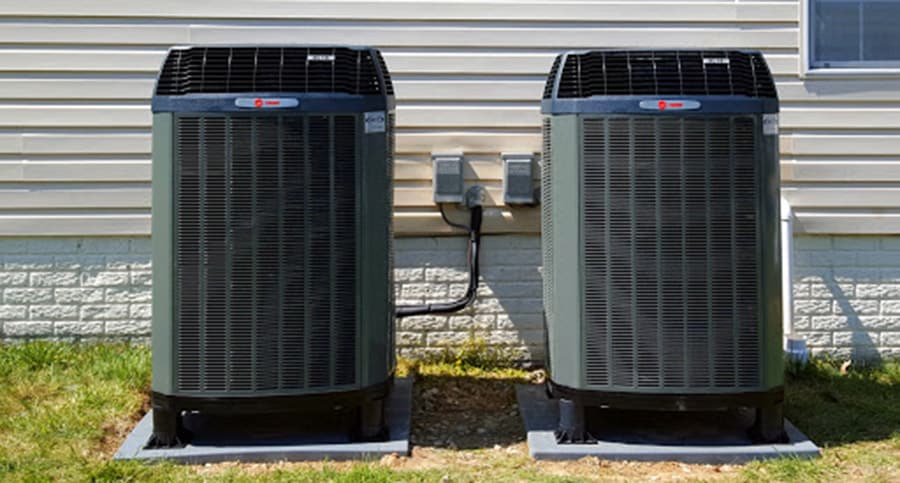
1. American Standard AccuComfort™ Platinum 19 Low Profile Heat Pump
SEER rating: Up to 19.5
Price: Not listed
Size availability: Four different sizes
- 23,600 BTUs
- 36,000 BTUs
- 48,000 BTUs
- 58,600 BTUs
Customer feedback/reviews: No written customer reviews are available. But, it has been rated in the top 5 HVAC companies for quality and durability, based on independent data by Consumer Reports, according to PickHVAC.com.
2. Trane XV19 Variable Speed Low Profile Heat Pump
SEER rating: Up to 19.5
Price: In the range of $10,500 to $14,500 including installation. But, the price can differ based on where you’re located and any requested modifications.
Size availability: Four different sizes are available
- 23,800 BTUs
- 36,000 BTUs
- 42,000 BTUs
- 58,600 BTUs
Customer feedback/reviews: According to reviews left on Consumer Affairs after 155 ratings, it has an average rating of 3.5 stars out of 5.
3. Coleman HC19B2421S
SEER rating: Up to 19
Price: No price is available online for this model. It’s best to contact the dealer.
Size availability: 24,000 BTUs – 2 ton
No other models are listed. But, information on this model is quite limited, so there may be bigger sizes. It’s best to contact a supplier to inquire about the availability of sizes for this model.
Customer feedback/reviews: According to reviews left on Consumer Affairs. Of the 64 reviews that were left, it got 1.5 stars out of 5.
4. York YZV 20 SEER Variable Capacity Communicating Heat Pump
SEER rating: Up to 21.
Price: They don’t give an exact price but say it’s $$$$ in the price category. I’m not sure exactly what this means. In my opinion, it could either mean it’s less than $10,000, or it could just mean it’s one of the most expensive models. For example, $$ is cheaper than $$$$.
According to PickHVAC.com, the unit itself costs $2,580, and including installation, it costs approximately $6,050.
Size availability: It comes in all the main sizes:
- 24,000 BTUs
- 36,000 BTUs
- 48,000 BTUs
- 60,000 BTUs
Customer feedback/reviews: According to PickHVAC.com, that lists some written reviews. People have had mixed experiences with York heat pumps – some found it really good, while others said they’d had better heat pumps in the past.
However, a lot of the reviews look fake. So, I’m not confident in saying either way.
No other reviews are available online.
5. Bryant Evolution™ Variable-Speed Heat Pump
SEER rating: Up to 19
Price: According to Modernize.com, the price for just the unit is $3,815, and after installation, it costs $9,112.
Size availability: 1 to 5 tons, which is equivalent to 12,000 BTUs to 60,000 BTUs
Customer feedback/reviews: 56 written reviews were left on the Bryant website, and the average rating came out to 4.5 stars out of 5.
Overall, it seems customers were very happy with this model.
6. Amana HC AVZC18
SEER rating: Up to 19
Price: No price is listed on their official website, but PickHVAC.com has stated the price, including installation, is between $4,180 to $7,580.
Size availability:
- 24,000 BTUs
- 36,000 BTUs
- 48,000 BTUs
- 60,000 BTUs
Customer feedback/reviews: There were 96 written reviews left on the official Amana website, and they gave it an average rating of 4.6 stars out of 5.
7. Lennox XP 25
SEER rating: Up to 23.5
Price: No price is listed on their official website. Dynamicairservices.com says that the average cost is $5,000 to $14,000 for both the unit and installation.
Size availability: There is no information available about what sizes the Lennox XP 25 comes in.
Customer feedback/reviews: There are 528 written reviews left on the Lennox website. And the average review rating is 4.5 out 5.
8. Carrier Infinity® 20 Heat Pump With Greenspeed® Intelligence
SEER rating: Up to 20.5
Price: The official Carrier website doesn’t list a price. But, Gshaservices.com says that it’s $5,599 fully installed.
Size availability: There is no information available about what sizes the Carrier Infinity 20 comes in.
Customer feedback/reviews: There are 97 written reviews left on the official Carrier website, and they have given an average rating of 5 stars, can’t get much better than that!
9. Rudd Econet™ enabled achiever plus® series three-stage (up17)
SEER rating: Up to 18.5 SEER
Price: No price is listed on their official website or available online.
Size availability:
- 24,000 BTUs
- 36,000 BTUs
- 48,000 BTUs
- 60,000 BTUs
Customer feedback/reviews: There are no reviews available online for this model.
10. Rheem 67-74 RP17 (Econet Enabled)
SEER rating: Up to 18.5
Price: There’s no price listed on the official Rheem website. But, PickHVAC.com says that it costs $1,935 for the unit and $5,680 including installation.
Size availability: 24,000 only.
Customer feedback/reviews: There are 39 ratings submitted to Consumer Affairs, and they gave it an average rating of 1.5 stars.
11.Goodman
Because no volume data is provided, I haven’t included a summary for this brand.
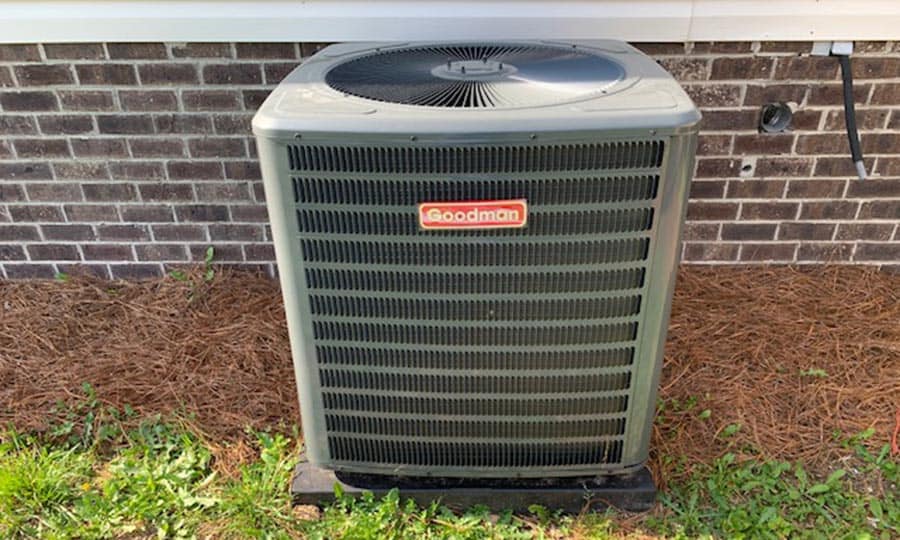
What is the Most Energy-Efficient Heat Pump?
The most energy-efficient heat pump is a geothermal heat pump. According to Dandelion Energy, a geothermal heat pump uses around 50% less electricity than an air heat pump. Instead of using outside air, a geothermal heat pump uses underground pipes to heat transfer.
This process is much more efficient because the ground is at a virtually constant temperature. Whereas the outside air temperature can fluctuate a lot, where the temperature gets very cold and very hot. So, an air heat pump has to work harder to change the air temperature.
Underground, though, the air isn’t exposed to the sun, rain, or wind, so its temperature only goes up and down a tiny bit.
This amounts to an energy cost saving of around $450 a month. Interestingly, an air heat pump and a geothermal heat pump cost roughly the same to install. A geothermal heat pump also has a longer life than an air heat pump.
According to Energy.gov, a geothermal heat pump lasts for around 25 years before it needs replacing.
On the other hand, an air source heat pump lasts on average 15 years before it needs replacing. So, a geothermal heat pump is the most efficient and is also the most economical.
But, there are a few drawbacks to a geothermal heat pump. They take MUCH longer to install. A geothermal heat pump takes on average 8 weeks to install, whereas a heat pump can be installed in 2 to 3 days.
I wrote about all the differences between a geothermal heat pump and an air heat pump in a recent article I wrote, which you can read by clicking [here, link: Heat Pump vs. Geothermal Systems: How To Decide What’s Best]. It has a full breakdown of the cost savings.
In Conclusion
All heat pumps can be noisy, but some are very quiet and only produce about 50 dB of sound as they’re operating. The top 3 quietest heat pumps are the:
- Amana HC AVZC18
- Lennox XP 25
- Carrier Infinity 20
They not only are quiet, but they have good SEER ratings and a very good average customer review score.
Of these three, the Amana is the quietest and has an operating volume of about 50 dB. Which is a similar volume to two people talking and slightly louder than the humming noise a refrigerator makes.


